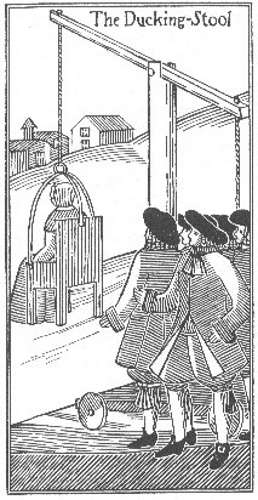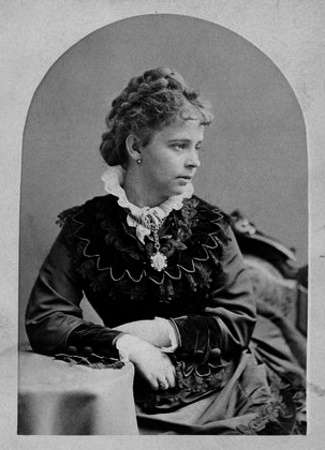Exorbitancy of the tongue, common railing . . . call it what you like. Early New England colonists had a problem: The Common Scold.
In 1634 while visiting Virginia, Thomas Hartley discovered a wonderful innovation he thought New England sorely lacked in addressing the the common scold – the ducking stool.
 Writing to Gov. John Endecott, Hartley describes how the southern colony managed to deal with a common scold.
Writing to Gov. John Endecott, Hartley describes how the southern colony managed to deal with a common scold.
“The day afore yesterday at two of the clock in the afternoon I saw this punishment given to one Betsey wife of John Tucker,” he wrote. By the violence of her tongue, he wrote, she “made his house and the neighborhood uncomfortable.”
A Common Scold
“She was taken to the pond near where I am sojourning by the officer who was joined by the Magistrate and the Minister Mr. Cotton who had frequently admonished her and a large number of people. They had a machine for the purpose that belongs to the Parish.”
They had already used it three times that summer.

He described it as a platform with four small rollers, or wheels, and two upright posts between which works a lever by a rope fastened to its shorter or heavier end. They fixed a stool to the end of the larger arm. Then they fastened Betsey to it by cords, her gown tied fast around her feet.
“The Machine was then moved up to the edge of the pond, the Rope was slackened by the officer and the woman was allowed to go down under the water for the space of half a minute. Betsey had a stout stomach, and would not yield until she had allowed herself to be ducked five times.
“At length she cried piteously, ‘Let me go. Let me go, by God’s help I’ll sin no more.’ Then they drew back the Machine, untied the Ropes and let her walk home in her wetted clothes a hopefully penitent woman.”
Alice Morse Earle
Alice Morse Earle notes the letter in her Curious Punishments of Bygone Days. Being a common scold was a fairly serious crime. It came from England under common law. Basically, a scold (sometimes called a common railer) was a person so outspoken and quarrelsome that their behavior became a public nuisance. Though both men and women could be (and were) convicted as common scolds, it was a charge more often applied to women. Married couples that argued too much could both get convicted and punished together.

Alice Morse
Punishments varied. The ducking stool never got as popular in New England as it had in the South. But convicted parties could face fines, imprisonment or gagging.
The crime was a persistent problem for the early New England colonies. In 1649 newspapers reported prosecutions of common scolds in Boston and Salem.
Massachusetts
In 1633, Maryland required every county to have the ducking stool Thomas Hartley so admired. Massachusetts, however, was slow to adopt it. As Henry M. Brooks notes in his work, Some Strange and Curious Punishments, the Massachusetts General Court in 1672 passed a law.
“Whereas there is no express punishment by any law hitherto established affixed to the evil practice of sundry persons by exorbitancy of the tongue in railing and scolding, it is therefore ordered, that all such persons convicted, before any Court or magistrate that hath proper cognizance of the cause for railing or scolding, shall be gagged or set in a ducking stool & dipped over head and ears three times in some convenient place of fresh or salt water as the Court or magistrate shall judge.”
John Dunton, writing from Boston in 1686, does not note the presence of a ducking-stool. But, he says,
“Scolds they gag and set them at their own doors for certain hours together, for all comers and goers to gaze at; were this a Law in England and well executed it would in a little time prove an effectual remedy to cure the noise that is in many women’s heads.”
Over time, the crime became less common. John Adams notes in his diary in July of 1766 “… a common Scold is punishable by putting into the Ducking Stool. Prosecutions rare, tho the offence frequent.”

New Cure for the Common Scold
The common law that covered scolding has been replaced in modern day by more specific statutes that govern domestic disturbances and disturbing the peace. A Massachusetts man, Judge William Cranch, finally put paid to the notion of the ducking stool.
In 1829, journalist Anne Royall so infuriated her political enemies that they had her convicted as a common scold in Philadelphia. On appeal, Royall argued that the crime carried no punishment other than ducking. And that, she argued, was cruel and unusual.
Cranch was a Weymouth lawyer and nephew of Abigail Adams. President John Quincy Adams had rescued his cousin from bankruptcy. He was serving as an appeals court Judge in Washington, D.C.
Cranch caught Royall’s case. His ruling: punishment by ducking was, in fact, barbaric and prohibited. But a scold, he ruled, could still receive a fine as punishment. He ordered Royall fined – and put ducking stools on the shelf as the common scold laws gradually fell out of use.
This story updated in 2023.

1 comment
Sounds like this was mostly applied to outspoken women…not surprising. The attitude behind it is still prevalent today when women are criticized for speaking up in ways that are accepted in a man.
Comments are closed.